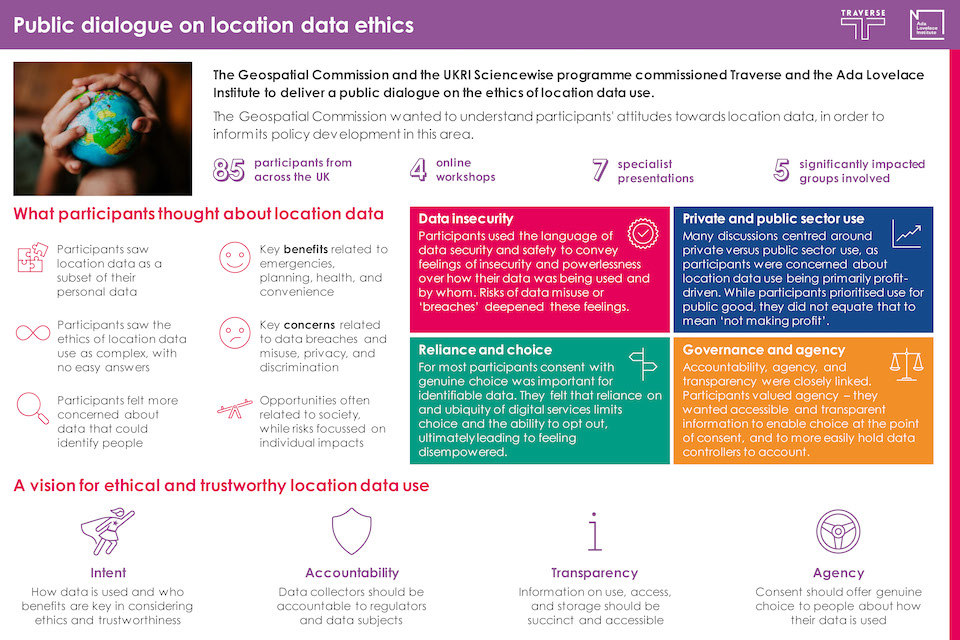Public dialogue on location data ethics - Foreword and Executive Summary
Updated 23 February 2022

image of Thalia Baldwin, Geospatial Commission Director
Foreword
Location data underpins our modern digital society, powering our everyday lives and driving innovation and better services. We have long been interested in capturing and accessing data about where we are and what we do. The widespread use of new technologies means that data about our lives, including location data, is available in increasing frequency, detail and accuracy. This necessary evolution of our geospatial ecosystem raises new and significant ethical considerations.
Last year, the Geospatial Commission published the UK’s Geospatial Strategy, with an ambitious vision to unlock the power of location data. The Strategy recognises that society can only continue to benefit from the widespread use of location data and its future opportunities if location data is used in a way that retains public confidence.
The Geospatial Commission therefore committed to providing guidance about how to unlock location data’s immense value, while mitigating ethical and privacy concerns. To inform this guidance, we embarked on a programme of work, starting with an independent public dialogue, which is one of the UK’s first deliberative consultations on location data. The dialogue has been supported by an independent and diverse expert Oversight Group that we formed to guide this process. The findings of the dialogue are captured in this report (pdf, 9.1 MB).
The report provides evidence on public perceptions about location data use, offering valuable insights into what citizens believe are the key benefits and today’s concerns. These findings can start to shape our priorities for future guidance. In this context, of particular note are the findings that relate to:
-
Personal location data: Location data can be defined as both personal data that can be used to identify individuals, and non-personal data that can describe the location of objects, features or aggregated population data. Participants generally felt more comfortable when location data was not linked with data about individuals, and when location data linked with data about people was aggregated and anonymous.
-
Who benefits: The report reveals how trust in the use of personal location data changes depending on whether participants felt the objective was to benefit wider society or to make profit. Participants were more content with businesses using their personal data when there was a clear and direct benefit to them or wider society.
-
Communicating clearly: Participants felt that there was a general lack of clear information around location data use and that succinct, more accessible communication could help overcome feelings of data insecurity and empower more informed choices.
Translating the evidence we are gathering into guidance is bound to be complex. This includes understanding where the public’s sentiments about data sharing differ from the decisions they make about their data every day, and why. Enabling innovation through improved access to location data will remain a priority. Innovations to date have given industry and governments the tools needed to take on the greatest global challenges, from protecting our planet from the impact of climate change, through to coordinating a public health response to the Covid-19 pandemic. We will continue our programme of work to explore the opportunities and how we operationalise the findings of the report, including what more transparency would look like in practice to move the public from feeling like data subjects to being empowered data citizens.
I am confident that, through engaging a diverse set of voices, we can continue to support the UK to reap the economic, social, and environmental benefits of location data in a way that mitigates ethical and privacy concerns and grows the trust of citizens. Today’s report is an important step in achieving that aim.
I am grateful to all those who contributed to this project, including the UK Research and Innovation’s Sciencewise programme, which provided funding and expertise; Traverse and the Ada Lovelace Institute, who designed and delivered the public dialogue; the members of our independent Oversight Group, in particular John Pullinger as chair, who ensured the expertise and independence of the project; and the members of the public, who so whole-heartedly participated and contributed to the debate.
Thalia Baldwin
Director, Geospatial Commission

infographic showing details including the number of participants in the public dialogue and their thoughts on location data
Executive Summary
When location data is linked with other data about people and the world we live in, we can gain important insights and create new services that greatly improve how we live, work and travel. With these new opportunities, there are also emerging privacy and ethical considerations. To continue to benefit from location data, it is important that these considerations are addressed, so that location data is used in a way that mitigates concerns and retains public confidence. Understanding public perspectives is key to this, as recognised in the UK’s Geospatial Strategy.
About the dialogue
Between June and September 2021, the dialogue engaged 85 members of the UK public in a series of online workshops and activities, to gather their views on what trustworthy and ethical uses of location data look like.
The dialogue consisted of a series of online workshops, where participants shared their perspectives towards location data use and reflected on the benefits, concerns, opportunities, and challenges it raises.
Participants considered information about how and why location data can be used, and what governance exists around it. They also heard from subject matter specialists, including data scientists, academics, and industry experts.
The project included focus groups with communities who might be specifically impacted by location data use. These included women who have experienced abuse, refugees and asylum seekers, and Disabled people. We additionally increased the sample of digitally excluded people and Black British people in the main workshops.
Public perceptions of location data
Awareness and understanding of location data
Participants brought a mixed range of awareness about location data to the dialogue. Initially, most participants reported that they knew only a little or nothing at all about location data, and many were surprised about how much location data they might be sharing and saw location data as a subset of their personal data. By the end of the dialogue, almost all participants felt they know a fair amount or a great deal about location data.
Benefits and risks of location data
Participants thought the key benefits of location data related to safety and public services, like health and city planning; while the key concerns related to data breaches and misuse, privacy and discrimination. Overall, benefits were most often framed as being for the wider public, while risks were focussed on individual concerns.
Lenses of security
Participants reflected feelings of insecurity and concern about how data about them was used and by whom. Many participants did not trust that data was being used in their best interests and felt powerless to change this. The risk that data might be misused or ‘breached’ deepened these feelings.
Accountability and governance
Participants discussed how effective regulation, accountability and transparency are essential for ensuring trustworthy uses of location data. Some participants were concerned about the ability of regulators and the government to effectively hold data collectors accountable, especially powerful multi-national companies. Most participants also felt that current information about data use is inaccessible to them, as it is too complex or hidden within lengthy text.
Reliance on and choices about data
Participants wanted more granular and less intrusive or complex ways to consent to, or have control over, how their location data is collected and used. They felt that the burden of solving challenges related to consent should not be on the data subject, and expressed feelings of resignation, disempowerment and/or ambivalence about location data collection and use.
Dialogue conclusions: towards trustworthy and ethical location data use
Throughout the dialogue, participants recognised that the potential uses of location data and their consequences are complex, and that there are no easy answers for ensuring ethical practice. When reflecting on how the benefits and concerns of location data could be balanced, participants reflected on various conditions that suggest four components of ethical and trustworthy location data use:
1. Intent to benefit society
Participants think that why location data is used and who benefits from it are important when considering whether location data use is ethical and trustworthy, and that benefits to members of the public or wider
society should be prioritised.
2. Effective accountability
Participants think data collectors should be accountable to regulators and data subjects, with consequences for breaches or misuse, and they questioned whether current governance is effective in achieving this.
3. Accessible transparency
Participants want data collectors to communicate in an accessible way what location data will be used for, who will have access, and how it will be stored, so people can make informed choices and ensure accountability.
4.Enable agency
Participants want more genuine ways to consent to and participate in ongoing data storage and use, and greater choice over how their data is used.
To our knowledge, this is among the first public dialogue projects on the specific topic of location data to ever be held in the UK. The findings from this dialogue should be at the core of any future policy and strategy work, to ensure that wider public interests are reflected.
